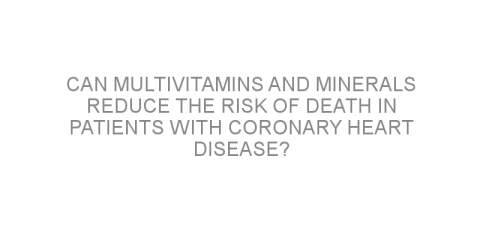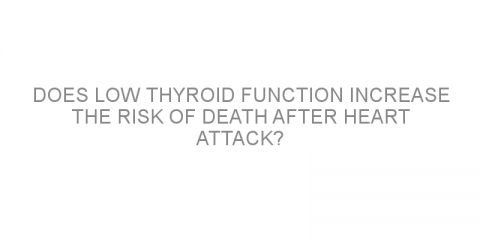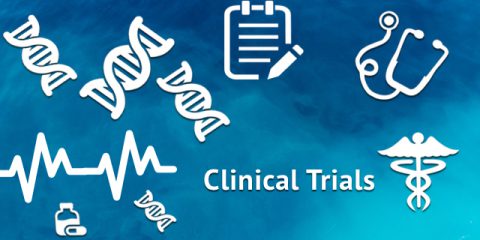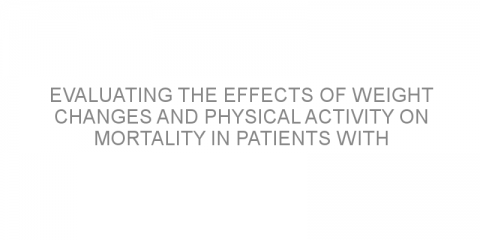In a nutshell This study examined whether there was a link between low diastolic blood pressure (DBP) and the frequency of angina in patients with coronary artery disease (CAD; heart disease caused by a low blood supply to the heart because of hardened and narrowed blood vessels). The authors concluded that low DBP is associated with an increased risk of...
Read MoreCoronary artery disease Posts on Medivizor
Can multivitamins and minerals reduce the risk of death in patients with coronary heart disease?
In a nutshell This study investigated if the use of multivitamin and mineral (MVM) reduces the risk of heart attack in patients with coronary heart disease (CHD). They found that MVM use reduced the risk of death in patients with CHD not taking statins (cholesterol-lowering drugs). Some background Coronary heart disease (CHD) is a condition that...
Read MoreDoes low thyroid function increase the risk of death after heart attack?
In a nutshell This study investigated if thyroid-stimulating hormone (TSH) levels are associated with a greater risk of death following a heart attack. They found that elevated TSH was associated with a greater risk of death following a heart attack. Some background Thyroid-stimulating hormone (TSH) is produced by the pituitary gland (in the...
Read MoreIs it dangerous to combine NSAIDs with blood thinning drugs?
In a nutshell This study investigated the safety of non-steroidal anti-inflammatory drugs (NSAIDs) in combination with blood-thinning drugs such as dabigatran (Pradaxa) or warfarin (Coumadin) in people with atrial fibrillation (AF; abnormal heart rhythm). It was determined that using NSAIDs increased the risk of bleeding and strokes in people with AF...
Read MoreEffects of once-daily trimetazidine in stable angina
In a nutshell This study investigated the effectiveness and safety of once-daily trimetazidine (Vastarel) in patients with stable angina (chest pain that occurs during physical activity). It was determined that once-daily trimetazidine reduced symptoms of angina, improved physical activity, and was well tolerated by most patients. Some background...
Read MoreClinical Trials Today
Prior to the 20th century, most people lived about 47 years in the developed world because of infectious diseases. In 1940, the first use of penicillin to treat infectious diseases occurred and penicillin became available in 1945 to the general public. Science and research conducted throughout the 1950s, 60s, and 70s, created more antibiotics so that life...
Read MoreEvaluating the effects of weight changes and physical activity on mortality in patients with coronary artery disease
In a nutshell This study investigated the effects of changes in body mass index, or BMI (measurement of weight that takes height into account) and physical activity on mortality in people with coronary heart disease (CHD). It was determined that high levels of physical activity reduced the mortality risk. It was also found that weight loss increased the...
Read MoreIs a combination of rivaroxaban and aspirin better than either drug alone?
In a nutshell This study investigated the effects of combining rivaroxaban (Xarelto) with aspirin, compared to each drug used alone, in people with stable coronary artery disease. It was determined that the drug combination reduced the risk of stroke, heart attacks, and deaths from cardiovascular causes, more than aspirin alone, but that it increased the...
Read MoreRisk factors and treatment strategies in coronary heart disease
In a nutshell This study investigated risk factors and treatments in patients with coronary heart disease (CHD). It was determined that risk factors like smoking, obesity, and high blood pressure are common. It was also found that while use of medications was common, especially at early stages, people with CHD were unlikely to participate in a disease...
Read MoreDoes early treatment of heart attacks have long-term benefits?
In a nutshell This study compared the effects of early and delayed invasive treatment in people with heart attacks. It was determined that early invasive treatment reduced the risk of having another heart attack in the short term, but did not affect the risk of mortality or long-term risk of heart attacks, compared to delayed treatment. Some background...
Read MoreDoes the severity of angina affect the results of treatment?
In a nutshell This study investigated whether the severity of chest pain (angina) affects the impact of different treatments for stable coronary artery disease (CAD) in people with type 2 diabetes (T2D). It was determined that those with more severe angina were more likely to need revascularization (PCI or CABG), and to have severe angina after...
Read MoreIs angioplasty as safe as coronary artery bypass grafting?
In a nutshell This study compared percutaneous coronary intervention (PCI) using drug-eluting stents (DES) to coronary artery bypass grafting (CABG) in patients with left main coronary artery disease (LMCAD). The study concluded that PCI was associated with a higher risk needing another procedure and heart attacks, but not of death or stroke. Some...
Read More













